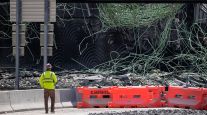Delaware Shuts I-495 Bridge Due to Structural Damage
This story appears in the June 9 print edition of Transport Topics.
The emergency closure of the wobbly Christina River Bridge in Wilmington, Delaware, last week turned shorthauls into long days for Sam Farruggio’s trucking fleet.
Reports that columns on a stretch of the Interstate 495 bridge were tilting led Delaware Department of Transportation officials to close the bridge indefinitely June 2, immediately creating a traffic headache.
Some 90,000 vehicles normally travel across the bridge each day — 10,000 of them trucks hauling freight in the region and along the East Coast.
Delaware Transportation Secretary Shailen Bhatt estimates it could be weeks before bridge experts would be able to analyze and repair the structure, which was built in 1974.
“This is a very serious situation that we’re lucky we caught in time,” Bhatt said at a news conference beneath the bridge last week.
Farruggio, owner of intermodal carrier Farruggio’s Express in Bristol, Pennsylvania, said he initially thought there would be a one-day interruption to business. But now, he said, his drivers would draw overtime for sitting in traffic many hours longer, his trucks would need to be diverted to costly tolled routes and his phone would be lighting up with calls from customers wondering when the trucks would arrive.
At press time, all the engineers inspecting the bridge knew was that four pillars supporting the bridge had developed a slight lean, putting the structure in danger of collapse if it was carrying traffic.
State DOT officials said they were investigating a range of options, including potential soft soils around the base of the piers, corrosion at the steel piles and compressible soils. Meanwhile, a project team assembled last week was continuing the process of removing all the soil adjacent to the bridge in hopes of finding the problem.
None of this was good news for the thousands of truckers who take the I-495 Wilmington bypass over the Christina River. Many will now have to take the even more congested Interstate 95 that cuts through the heart of Wilmington, or travel east over the Delaware River into New Jersey, head north and then double back across the river into Pennsylvania.
“We decided to reroute trucks on the New Jersey side north and south to avoid the I-95 backlog through Delaware,” Farruggio said.
Farruggio’s Express operates about 130 power units that primarily move loads in and out of ports and rail yards located in Pennsylvania, Maryland, Delaware, New Jersey and New York.
“Our average length of haul is less than 75 miles,” he said. “So when you spend four hours in traffic for a 50-mile haul, that’s four hours in each direction.”
News of the bridge closure also has affected Mustang Expediting Inc. of Aston, Pennsylvania, the carrier’s president, Kimberly Berg, said.
Mustang owns 20 power units and hauls general freight. Roughly a third of its hauls head south toward Virginia, straight into I-95 congestion that has worsened since the bridge closed.
“We’re allowing a lot more time going down to Delaware and coming up from Delaware,” Berg said. “We’re right on the border of Delaware, so it’s causing havoc for our drivers coming back.”
The company sends trucks to Baltimore and Washington daily, she said. “So all of our trucks have to go I-95 or I-495, and now everybody’s being diverted to I-95.”
There’s a detour option, but it’s too congested, she said.
A state DOT spokeswoman said that despite the congestion, trucks are still getting in and out of the Port of Wilmington, a hub for automobiles, fresh fruit and juice concentrate as part of its annual cargo of more than 5 million tons.
However, Lee Derrickson, executive director of the Delaware Motor Transport Association, said that trucks visiting the port from points north will face delays because they will have to divert to I-95 and then turn back north on I-495 to reach the Terminal Avenue exit just south of the Christina River Bridge.
“We came off a very harsh winter and we were looking forward to keeping the wheels rolling,” Farruggio said. “There’s always a bump in the road, but we’ll get through this one.”



